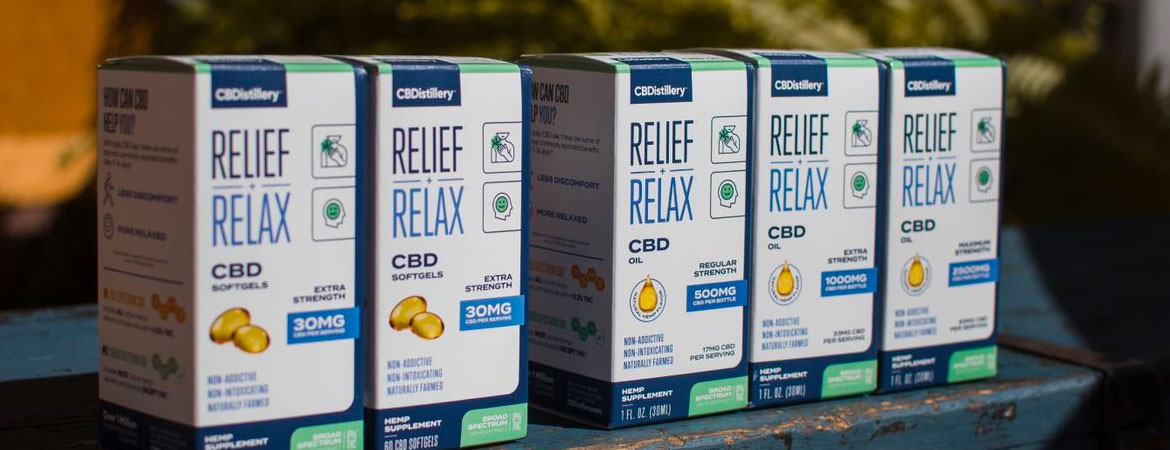- Free Shipping Over $75
- 60-Day Money-Back Guarantee
Shop Popular Products
Made from US-Grown Industrial Hemp
100% Clean Ingredients
Rigorously Tested, Quality Assured

Natural hemp oil contains CBD and more than 400 additional plant elements. Within that list of potentially beneficial plant compounds are more than 100 different cannabinoids, phytochemicals shown to have a considerable impact on health and wellness. The oil extracted from industrial hemp plants also contains trace amounts of tetrahydrocannabinol (THC) up to 0.3%, known as full-spectrum hemp extract.
Although industrial hemp plants do not synthesize enough THC to cause intoxication, many CBD users avoid ingesting this somewhat controversial cannabinoid by selecting tinctures, capsules, and topicals products made with CBD isolate. While this flavorless, odorless form of CBD may be the best option for some, many people looking to avoid THC find broad-spectrum CBD products another great option.
To help determine if broad-spectrum CBD might be your best option, you may find it beneficial to review the different types of CBD and the differences between the two product types most people initially choose between full-spectrum CBD and CBD isolate.
Full-spectrum CBD is your least processed option, a product that contains the same terpenes, flavonoids, and other plant elements as the original plant source. The diverse cannabinoid profile includes trace amounts of THC. To be classified as industrial hemp, the extract must contain less than 0.3 percent THC.
CBD isolate is more processed than full-spectrum hemp extract. The processes used to isolate CBD from unrefined hemp extract separates individual plant components. All that remains after processing is a white crystalline powder that is 0% THC.
Broad-spectrum CBD is a hybrid of sorts, a product offering the same health and wellness potential as full-spectrum extracts while providing a second option for anyone who prefers avoiding THC. Although all but trace amounts of THC have been removed, the other potentially beneficial cannabinoids, terpenes, flavonoids, and other plant elements are still available to be utilized by your body.
Many people find full-spectrum CBD tinctures, capsules, and topical products more potent than the same products made with CBD isolate because of the combined contributions of the additional cannabinoids, plant terpenes, flavonoids, and other potentially beneficial plant components. Those claiming the effects of full-spectrum CBD stronger are likely experiencing a fascinating phenomenon called the entourage effect, a benefit unique to cannabis products.1
The theory of the entourage effect explains how the minor cannabinoids in hemp extract interact with the plant’s terpenes and other plant components to magnify and multiply the therapeutic potential of each plant element, including the effects of the CBD.2 Although the trace amounts of THC in full-spectrum CBD contribute to that benefit-multiplying effect, most CBD users find broad-spectrum products just as effective as full-spectrum CBD because the two products have similar cannabinoid and terpene profiles. Some of the many plant elements shown to contribute to the health and wellness potential of broad-spectrum and full-spectrum CBD include:
People are using broad-spectrum CBD for many of the same health benefits they use full-spectrum CBD oil and products made with CBD isolate. CBD (cannabidiol) is a plant element shown to have considerable cannabinoids that interact with the receptors of the largest regulatory system in the body, the receptors of the endocannabinoid system.3
CBD, and the many other plant-based cannabinoids in broad-spectrum hemp extract, work by supporting essential functions within your body, keeping them working as they should. Some of the many processes regulated by ECS function include:
Ideally, your body would create all the ECS messengers needed to keep essential processes working efficiently. But things don’t always work out the way they should. Numerous internal and external factors, including the effects of illness, injury, and stress, can create a demand for ECS messengers that exceeds the available supply. Supporting ECS function with hemp-derived CBD helps protect your body from the potential impact of endocannabinoid system deficiencies.4
The best hemp-derived CBD products are sourced from non-GMO industrial hemp seeds grown using natural farming practices. You can protect yourself from a potentially disappointing purchase by sticking with a reputable product manufacturer that publishes third-party test results on their website. Used by CBD companies to ensure product purity, potency, and quality control, third-party test results can also be used by consumers to verify the cannabinoid content of their broad-spectrum CBD products.
When viewing the third-party test results for broad-spectrum CBD oil, you should see trace amounts of several plant-based cannabinoids, including CBN (cannabinol), CBG (cannabigerol), and CBC (cannabichromene). You should also be able to verify that the THC has been removed. Products that contain 0% THC will show a 0 or ND (not detected) on the appropriate line (s) of the third-party test results. High-quality CBD oils are also mixed with a highest-quality carrier oil, such as mct oil or coconut oil.
If you’re intrigued by the health and wellness potential of full-spectrum CBD but feel uncomfortable using products that contain even trace amounts of THC, consider adding broad-spectrum CBD to your daily routine, such as our new CBD Anytime and Nighttime Gummies or broad spectrum oil tinctures. Broad-spectrum CBD works just as well as full-spectrum products but contains 0% THC*.
For a quality assortment of CBD tinctures, topicals, gummies, and capsules, visit CBDistillery™. All CBDistillery™ products are third-party tested.
* Third-party tested to ensure non-detectable levels of THC (less than .05%)
Additional Sources: